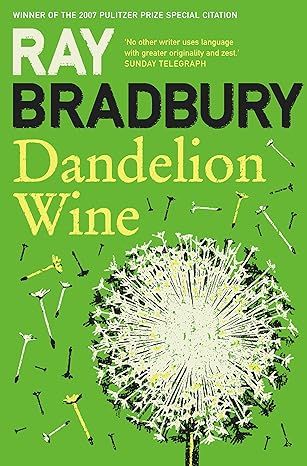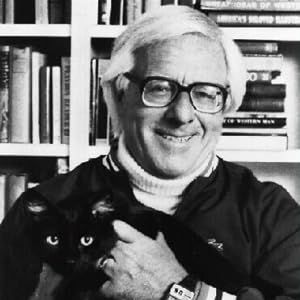Dandelion Wine (English and French Edition)
4.5 out of 5
3,529 global ratings
Ray Bradbury's moving recollection of a vanished golden era remains one of his most enchanting novels. Dandelion Wine stands out in the Bradbury literary canon as the author's most deeply personal work, a semi-autobiographical recollection of a magical small-town summer in 1928.
Twelve-year-old Douglas Spaulding knows Green Town, Illinois, is as vast and deep as the whole wide world that lies beyond the city limits. It is a pair of brand-new tennis shoes, the first harvest of dandelions for Grandfather's renowned intoxicant, the distant clang of the trolley's bell on a hazy afternoon. It is yesteryear and tomorrow blended into an unforgettable always. But as young Douglas is about to discover, summer can be more than the repetition of established rituals whose mystical power holds time at bay. It can be a best friend moving away, a human time machine who can transport you back to the Civil War, or a sideshow automaton able to glimpse the bittersweet future.
Come and savor Ray Bradbury's priceless distillation of all that is eternal about boyhood and summer.
336 pages,
Kindle
Audiobook
Hardcover
Paperback
First published December 31, 2000
ISBN 9780007284740
About the authors
Ray Bradbury
In a career spanning more than seventy years, Ray Bradbury, who died on June 5, 2012, at the age of 91, inspired generations of readers to dream, think, and create. A prolific author of hundreds of short stories and close to fifty books, as well as numerous poems, essays, operas, plays, teleplays, and screenplays, Bradbury was one of the most celebrated writers of our time. His groundbreaking works include Fahrenheit 451, The Martian Chronicles, The Illustrated Man, Dandelion Wine, and Something Wicked This Way Comes. He wrote the screen play for John Huston's classic film adaptation of Moby Dick, and was nominated for an Academy Award. He adapted sixty-five of his stories for television's The Ray Bradbury Theater, and won an Emmy for his teleplay of The Halloween Tree. He was the recipient of the 2000 National Book Foundation Medal for Distinguished Contribution to American Letters, the 2004 National Medal of Arts, and the 2007 Pulitzer Prize Special Citation, among many honors.
Throughout his life, Bradbury liked to recount the story of meeting a carnival magician, Mr. Electrico, in 1932. At the end of his performance Electrico reached out to the twelve-year-old Bradbury, touched the boy with his sword, and commanded, "Live forever!" Bradbury later said, "I decided that was the greatest idea I had ever heard. I started writing every day. I never stopped."
Read more
Reviews
Josh Mauthe
5
Utterly lovely, even with my resistance to nostalgia for small town life
Reviewed in the United States on February 10, 2024
Verified Purchase
Most of my exposure to Ray Bradbury has been via his more genre-oriented fare - an area which I tend to prefer to nostalgia and overly poetic prose about small-town America - and so I've been putting off Dandelion Wine for a bit now, expecting to bounce off of it given my aforementioned aversion to its topics and mood. And yet, despite those misgivings, I couldn't help but find myself caught up in Dandelion Wine, which has an odder spirit to it than I expected, mixing its sepia-toned memories of a long-forgotten summer with glimpses of magic and even some horror, as Bradbury makes use of a lot of his previous written stories (including "The Ravine," which I always liked) to create a vivid summer via a collage effect of interrelated - and unrelated - tales. I didn't know that Dandelion Wine was a fix-up novel when I picked it up, and oddly, that would have made me more inclined to pick it up; what it means is that Bradbury is ever drifting here, mixing and matching stories without worry about pigeonholing himself beyond "summer through the eyes of children in the early 20th century." Maybe that means memories of the past through an elderly general; maybe that means an unlikely romance separated by a generation; maybe that means a serial killer in the outskirts of town; and maybe it just means the departure of a close friend without warning. Somehow, it all works, and while the prose is a little heavy-handed when it comes to the poetry, it all works and creates something (to steal a descriptor from a friend) "utterly lovely." Nostalgia may be a toxic impulse, as John Hodgman says, but there's also something beautiful about being reminded about the limitless possibilities of youth, and if Bradbury is a little syrupy at times, it all still works and gives you something whose charm and simplicity is hard to not be won over by.
Read more
Kindle Customer
5
Vintage Bradbury
Reviewed in the United States on October 24, 2013
Verified Purchase
Ray Bradbury August 22nd 1922 - June 5th, 2012 When Ray Bradbury died reactions came from everywhere including from President Obama. Surprising to me, few mentioned the one of his works that meant so much to me and affected my life so deeply. While he was most known to the general public for his science fiction, I found his mostly autobiographical novel Dandelion Wine to be the most impactful. At the same time it best illustrated Bradbury’s incredible command of the language, his ability to stir the imagination, and the way in which he could open windows on life.
I couldn’t count the number of times I would reread a single sentence and become overwhelmed with admiration and envy at how he used words to create images in the mind’s eye. All this was particularly on display in Dandelion Wine and its sequel, Farewell Summer. For Bradbury, it couldn’t be just water. “Nothing else would do but the pure waters which had been summoned from the lakes far away and the sweet fields of grassy dew on early morning, lifted to the open sky, carried in laundered clusters nine hundred miles, brushed with wind, electrified with high voltage, and condensed upon cool air. This water, falling, raining, gathered yet more of the heavens in its crystals. Taking something of the east wind and the west wind and the north wind and the south, the water made rain and the rain, within this hour of rituals, would be well on its way to wine.” Essentially, Dandelion Wine is the story of a summer in the life of a twelve year old boy as he comes to understand what it means to be alive. But it is also a time capsule for the year 1928 of life in a small town when everyone’s world was much smaller and more compact. There is horror, love, comedy, wonder, nostalgia, and human relations. Bradbury could find unique ways to describe them all.
I first read Dandelion Wine in 1957 when I wasn’t much older than Douglas Spaulding, the central character. It helped me put life in perspective as I was leaving high school. I read it the second time in the early ‘80s when I introduced my daughter to it. Kelly and I sat on our front porch swing one warm summer evening and I read aloud to her the story of Bill Forrester and Helen Loomis. It was all I could do to finish it and when I did we both had tears streaming down our cheeks. Such was the power of imagination and Bradbury’s ability to stroke it to life using just words.
I read it the third time in preparation for reading the sequel, Farewell Summer, written 55 years after Dandelion Wine. Like a fine wine, it had only gotten better with age. Appropriately, Farewell Summer was given to me by Kelly and I read it on summer’s eve 2012. It was the perfect beginning for yet another summer.
In both books the ravine in Green Town, Illinois, based on Waukegan, Illinois where Bradbury grew up was a central feature. I couldn’t resist going to Googlearth to see if the ravine was real. It was. And, it is still there even after Waukegan had changed from a small town to a satellite of Chicago. I was pleased to simply find I could locate it. But when I zoomed in and highlighted the little tree symbol I found the ravine is now Ray Bradbury Park. Perfect!
Dan Winters June 29, 2012
Read more
145 people found this helpful
Terry
5
Capturing Summer Like Lightning Bugs
Reviewed in the United States on May 27, 2013
Verified Purchase
Ray Bradbury is usually one of my October go-to writers. To sit by an open window on an autumn evening reading Something Wicked This Way Comes is to experience a literary overdose; a sensory explosion of leaves, skies, and enchantment. Prior to reading Dandelion Wine, I had no idea Bradbury could weave this sort of magic during the hot, stifling summer months.
Reading Dandelion Wine was not so much about reading about the impressions one hot summer left on a sensitive, young Illinois boy, but more about reliving the experiences and impacts hot Virginia summers left on young Terry Ferrell. The further I read into the novel, the less I saw of the excitable Douglas Spaulding. Instead, I saw 12 year old me running through the pages with blades of freshly mowed grass sticking to wet toes, while finding magic in every branch and twig in the little woods beside the house. Douglas's grandfather transformed into my grandfather, taking me on rides on the back of his tractor to feed the cows and collect the hens' eggs. Douglas's summer traditions and memories became my own recollections.
From a traditional reader's standpoint, this is a wonderful novel and one that should be added to your summer reading list. I'll even go far enough and suggest this novel deserves a place on the shelf right beside The Cather in the Rye and To Kill a Mockingbird, and maybe even more deservingly so. Bradbury constructs passages and events that make all of us feel like a twelve year old boy in the summer of 1928. It is this ingenious construction and combination of syntax, symbols, and senses that the novel almost warps from a novel into a carefully and intricately laid map of suggestions guaranteed to lead the reader back to their lost and maybe slightly forgotten summers of youthful magic.
Upon reading the very last sentence of this novel, I had tears in my eyes. The type of tears that are little bittersweet, wet flecks of crystal, maybe chipped from a hot July ice block, that come from when you are reunited with someone you have not seen for years and are then forced to say goodbye again all too soon. Like the first day of a new school year, the goodbye you thought you had an endless summer to put off saying comes quicker than you ever thought possible. But, in the end, you are glad you had chance, no matter how short.
Read more
6 people found this helpful
Steven Cain
5
A dish of lime vanilla ice...
Reviewed in the United States on June 16, 2005
Verified Purchase
...The trigger phrase for one of the most haunting sub-stories in this work of genius. I haven't read the book in years, but I have just ordered it from Amazon.com.
Gabriel Bernstein has got it. It is perfect. Ray Bradbury is a beautiful writer, whose very reverence for LIFE itself is a joy to behold.
The sheer quality of the reviews for this masterpiece tells you something about the kind of reaction that the average reader has had. It touched them. It reached them, in a way that few things ever do. Transcendent is certainly the word to describe the experience I had with this and other Bradbury books - the breathtakingly original The Halloween Tree being another must-have.
In the section I referred to in the title of this review, a young man meets an elderly lady in an ice cream parlor/store and they are both triggered by the phrase "a dish of lime vanilla ice". The inference is that they are a pair of star-crossed lovers, who either have been a couple in the past (in another life) or will be in the future, in a time when a young boy meets a young girl in a similar setting, and they re-experience this magical, soul-triggering phrase...
As a writer myself, I can appreciate the sheer magic that Bradbury shoe-horns into every paragraph. The warmth, the humanity, the feeling of just being glad to be alive in order to savor every sunrise, every cold winter's morn, the sound of the crickets, the smell of the apple blossom, the rumble of an old Ford, the impossible sweetness of that heart-stopping first kiss...
I live in a small town myself, and ordering books and CDs is a frustrating task. I cannot thank Amazon enough for being my lifeline to so many modern works of genius, such as this and indeed any other book my this true Modern Master.
By the way, Doug Spaulding is a combination of Bradbury's middle name Douglas and his father's surname, Spaulding (his mother was Bradbury).
I simply cannot recommend this highly enough.
Read more
12 people found this helpful
Steve_T_USA
5
Vintage Bradbury Fantasy Is My Favorite
Reviewed in the United States on July 3, 2000
Verified Purchase
DANDELION WINE is first and foremost the story of a 12 year old boy discovering that he is alive. I was lucky enough to read this gorgeous, perfect novel, wrapped in a library's dandelion yellow hardcover, the summer of my 12th year, in the small town of New Haven, Indiana, probably wearing my own pair of Red Ball Jets or Keds, lying in my living room as usual, curled up in a chair with the screen door open to let in the blustery summer wind and sun, with the lush green Indiana grass blowing in waves just outside. I understood what Bradbury was saying at age 12, an incredible thing in itself, since the themes here are fairly grown-up. Essentially, this book is about a boy flooded with the sudden realization of his own "aliveness", and never has a child's experience of innocent living been so perfectly, passionately illustrated. Douglas Spaulding lying in the grass, or feeling the keen pleasure and pain of carrying heavy laden buckets of self-picked berries out of the woods while the handles crease the insides of his hands. Douglas Spaulding discovering the wonder of a Number Two pencil, and the joy of rising early in the morning to watch his town come to life with the sunrise. Douglas Spaulding discovering that nothing makes a boy fly weightless through his summer vacation better than slipping his feet into the cool, cloudwrapped heaven of a new pair of tennis shoes. I found this book, at age 12 and several times since, to be an experience ranking with the most important books about human life that I have ever read. Bradbury sees so much, and conveys the experiences so clearly that one knows what Douglas and Ray know by the end. This is a book about passion and joy and being fully alive from moment to moment. It is a sonnet to and affirmation of childhood and innocence of such persuasive power that it has become a key volume of my core library. I don't expect everyone to have such a trascendent experience in the reading, and not everyone is fortunate enough to read this book at as perfect a moment as I did. But it is undeniable in its power and equal to the greatest work Ray Bradbury has produced, in my opinion. I was fortunate enough to meet him and thank him for it while at college. But this book has meant more to me than I could tell him. Give this to a boy you care about, or read it to evoke, soothe and elevate the child in you. It is pure poetry, Bradbury at the height of his powers, written with genius, on the vital topic of the nature of life. I can only say Douglas Spaulding has never left me. You may find him equally provocative.
Read more
315 people found this helpful
Chris O
5
Bottle up your own Dandelion Wine memories
Reviewed in the United States on December 28, 2021
Verified Purchase
When I think of Ray Bradbury, I usually think of science-fiction or at least fantastical-fiction. Dandelion Wine captures the magic and fantastical of his other writing but it does so in a much more subtle manner.
This book is a story of the summertime adventures of Douglas Spaulding, a 12-year old boy in the small town of Green Town, Illinois in 1928. Douglas' experiences vary wildly in scope and nature but from a high level, they could mostly be considered fairly ordinary. And yet, Bradbury weaves them into magical tales of growth and imagination.
The title of the book comes from the story of Douglas' grandfather bottling dandelion wine throughout the summer and Douglas presenting it as a metaphor for bottling up the various experiences and memories of each summer day. Each golden bottle represents a different memory, tucked away to be retrieved and savored at a later date.
For the first few chapters, I kept waiting for something supernatural or literally magical to sweep onto the scene and take over the plot with its fantastical presence. Instead, each story works its way methodically through the pages and showcases the magic to be found inside the ordinary moments of life. The magic of extra speed found in a new pair of sneakers, the "time machine" to be experienced by listening to an old community member talk about their past, the sorrow of death bringing the painful realization that life will one day end.
Each of the short scenes explores concepts of human nature and our interactions with one another. The stories remind us of the imagination and freedom of youth coupled alongside the realities learned as we grow into adults. In many ways, this could be read as a nostalgia for life in small town America a century ago. And yet, the emotional truths presented still resonate today.
Our technology may have advanced and our lives may be more hectic, but the human condition remains and we should stop and consider how we interact with those around us and with the events we experience. We should bottle up our own Dandelion Wine memories so that we can savor them and learn from them and share them with others.
4.5 out of 5 stars
Read more
18 people found this helpful
michael chad cleary
5
The diversity of Bradbury
Reviewed in the United States on November 21, 2023
Verified Purchase
Book one in the Green Town series is a colorful and poetic journey following the adventures of a 12 year old boy named Douglas over the course of a summer. Some readers may be wondering when something dark, scary, magical, or mythical will happen--but this isn't that type of book. In this work RB shows exactly why he had such a large fanbase by showcasing his ability to not be put in any particular genre. He can do horror, he can do sci-fi, he can do mystery, he can do adventure! This is a book for a writer to read in order to see how a good book is written. Many people are put off by Bradbury's sometimes semi-pretentious word usage, but I truly think the man saw things in a magical way. He works very hard in this novel to share that with the reader and he does it beautifully. As I explored the first few chapters I began to realize it isn't about trying to understand every word he writes, but rather let the town take shape in your mind with the words on the page. Bradbury seems to be more prone to use descriptive language as it relates to objects rather than people which allows the reader to create the characters appearances. The much like SWTWC is a must have addition to your Bradbury collection!
Read more
3 people found this helpful
Melissa
5
Magical nostalgia
Reviewed in the United States on September 29, 2024
Verified Purchase
I don’t have words to describe this book. It’s exactly the feeling of nostalgia, brought to life with such vivid descriptions as to transport you directly to Green Town Illinois, 1928. It’s a craving to go back to the simple pleasures of childhood, of days gone by, longed for and barely glimpsed. A life seen in memories of faded, sepia toned photographs. It was beautiful. Magical. At times truly terrifying. Sad. Funny. Heartbreaking… because it’s over.
Its happiness. Life and death. Lived in someone else’s memories, of a time and place never seen but nonetheless experienced. I’m so enchanted. And left … wistful. Bereft. In desperate need of a better thesaurus.
Someone with far superior words than I, will and has described it better than I could possibly hope to. I just, so so so recommend this book.
————————————————————— spoilers
“Bees do have a smell, you know, and if they don’t they should, for their feet are dusted with spices from a million flowers.” ~pg ix. Just This Side of Byzantium An Introduction
“Was there, then, no strength in growing up? No solace in being an adult? No sanctuary in life? No fleshly citadel strong enough to withstand the scrabbling assault of midnights?” ~pg 54
Pg 184 William Forrester and Helen Loomis… sighhhhh
Pg 209 Lavinia Nebbs almost dying… The Lonely One 😳🫨
The Tarot Witch and “Hey, nonny no!” Pg 249
Doug getting sick. And Mr Jonas. Pg 272
Grandmas’ cooking and Aunt Rose. They kicked her out. 😂 Pg 308 And Doug fixed it for Grandma. He paid it forward.
And then… sleepily but faster than a blink…summer ends.
Read more
BOB
4
One boy’s early awareness of magic and mortality
Reviewed in the United States on May 10, 2022
Verified Purchase
As part of my growing adolescent fascination with the work of Ray Bradbury, of course I read ‘Dandelion Wine’. However, it was one I have not revisited in almost 50 years so my recollection of it is less detailed than many of his other classic books. It’s a collection of interconnected short stories, some previously published, again set in Green Town, Illinois, the fictional counterpart for Waukegan, Illinois where Bradbury spent his first years up until the beginning of his adolescence.
Many of his stories, whether they’re set in Green Town or some other anonymous Midwest town in the 20’s and 30’s resonated with me from the beginning. My father was born just a few months after Bradbury and grew up during that same time in another small town in Missouri, which I recall visiting a few times in my childhood and seeing a neighborhood not much different from Bradbury’s, and a house almost literally unchanged from the time when my father was a boy.
That nostalgia, that yearning for the freshness and intensity of a child’s perception, when a boy will find magic in a birdbath and an earth-scented basement, definitely spoke to my soul and still does, 50 years later.
The main character is a Ray surrogate, a twelve-year old boy named Douglas Spaulding (Bradbury’s middle name is ‘Douglas’) who has a ten-year old brother named Tom. They live with their parents, grandparents, and great-grandmother in an old house that is sturdy and roomy enough to accommodate a few boarders. One of the ‘beginning of summer’ rituals is the bottling of dandelion wine that will last the entire summer and beyond, at which point it will be a way of preserving what was memorable about the summer that just passed. ‘Hold summer in your hand, pour summer in a glass, a tiny glass of course, the smallest tingling sip for children; change the season in your veins by raising glass to lip and tilting summer in.’
During this particular summer, Doug fully realizes, for the first time, that he is alive and, conversely, that he will die. He holds mortality at bay as much as he can, with special sneakers in which he can run from one end of the town to the other and working out a clever bartering trade with the shoe salesman as a way to “buy” the sneakers. Doug could be a future salesman himself, persuading the salesman to try on a pair himself so he will know what he’s selling and how it actually feels to wear a pair. The future writer Doug also wants to document every significant event that happens to him this summer of 1928.
His younger brother Tom, on the other hand, is more logical and reasonable. While Doug chronicles the events of the summer, Tom records data such as the first rainfall and other meteorological data. Tom also seems to me to be the wiser of the two, reasoning with and calming down the melodramatic Doug on more than one occasion.
Everything in the town acquires new meaning to the otherwise carefree and playful Doug. There are discernible boundaries between civilization and wilderness in this little hamlet, the most notable example being the ravine: ‘The ravine was indeed the place where you came to look at the two things of life, the ways of man and the ways of the natural world. The town was, after all, only a large ship filled with constantly moving survivors, bailing out the grass, chipping away the rust.’
The death of his great grandma also occurs this summer. After a lifetime of activity and housekeeping and family keeping, she decides that she has lived long enough. She has no discernible ailment, just a “mild but ever-deepening tiredness”. She has to assure Doug and Tom that the time for doing all this activity has come to an end and that they must learn to accept it.
Just as disturbing for Doug is when his best friend John Huff tells him that his father is being transferred to Milwaukee .His family is leaving on the train that evening. John is a budding young superman. He is a master pathfinder, swimmer, climber and jumper. He is also not a bully. He is kind as well as smart. As far as Doug is concerned, he is a god. For their last play activity, they play a game of hide-and-seek. Doug volunteers to be ‘it’, hoping by controlling the pace of the game to prolong John’s departure. John wraps that one up and agrees to play one more game, with him as ‘it’. With Doug and the other boys frozen into ‘statues’, John punches him on the arm gently, saying “So long” and then runs.
There is even a serial killer in Green Town, referred to as The Lonely One. Young spinster Lavinia Nebbs and some of her friends are worried about the disappearance of another of their friends. Rumors of the Lonely One being on the loose abound with the deaths of two young women occurring within the past two months. With the disappearance of their friend they have ample reason to be concerned. Then they find her, lying dead on the ground. They find the police and, after he finishes questioning them, they are free to leave. Lavinia, putting on a brave front, suggests they go to a Charlie Chaplin movie to stave off their fear. This works pretty well until the film ends, the last feature of the night, and they all have to walk home in the dark. Lavinia, still trying to hide her fear behind a brave front, agrees to walk her friends home first, meaning that she’ll have to walk the rest of the way to her house by herself. Bradbury’s mastery of suspense is particularly evident in this chilling and terrifying episode. I won’t reveal the outcome.
There is one episode in which Doug and Tom, primarily Doug, come to believe that a wax, fortune-telling “Tarot Witch” automaton is actually a mummified queen from ancient Egypt. In reality it is a slot machine in which you put in a penny and out comes a card with your fortune written on it. The alcoholic owner is disgusted with it and his failing slot and pinball machine business and ready to throw it in the trash heap. Doug and Tom attempt to rescue it. This sequence is long and tedious and has the effect of Tom and Huck rescuing Jim near the end of ‘Huckleberry Finn’. In both cases it’s an unwelcome diversion that detracts from the power of the novel.
Overall, ‘Dandelion Wine’ works. It is not as disjointed as it seemed to me 50 years ago when I could detect the short story origins of much of it. Depicting the course of a summer is by its nature episodic. There are moments where it seems that everybody talks like Bradbury writes, even the semi-literate characters, and with a zeal and enthusiasm that gradually took over most of his later fiction. At its core, however, it captures, through a poetic filter, the magic and intensity of a child’s perception and his awareness that all this beauty surrounding us is fleeting so we may as well appreciate it as much as we can while we can.
Read more
27 people found this helpful
Jaspeter
3
Great read, bad book
Reviewed in the United States on June 19, 2024
Verified Purchase
Ray Bradbury dragged me in with his style when I recently read Farenheit 451. He kept me hooked with Dandelion Wine. This book is full of imagery and nostalgic longing for a place and time that doesn't exist anymore. There are stories that stretch the limits of belief (particularly The Happiness Machine), yet somehow they still seem to fit comfortably within the world of Green Town. I don't often reread books, but this might fall into a rotation.
The bad part of this was that the physical book, itself. The font is difficult to read. The binding is brittle. And chunks of pages separated from the spine. If there's another version besides this one, or the e-book, maybe you'll have a better experience.
Read more
Top Ray Bradbury titles
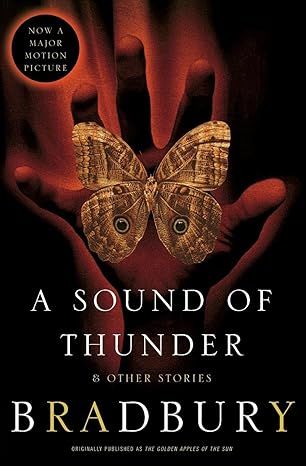
A Sound of Thunder and Other Stories
4.5
-
524
$13.09
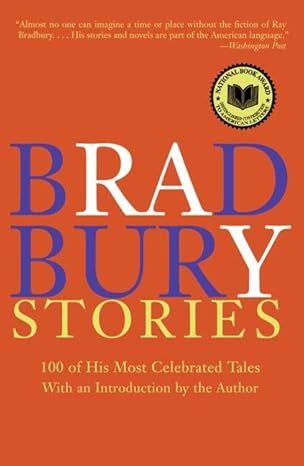
Bradbury Stories: 100 of His Most Celebrated Tales
4.7
-
1,363
$11.60
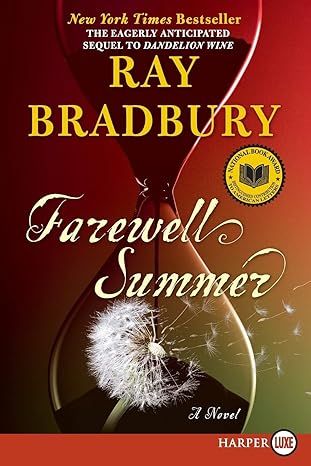
Farewell Summer
4.3
-
731
$0.99
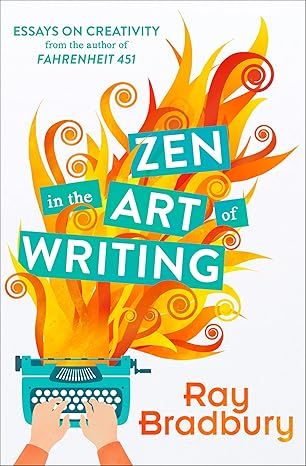
Zen in the Art of Writing
4.4
-
1,527
$14.33
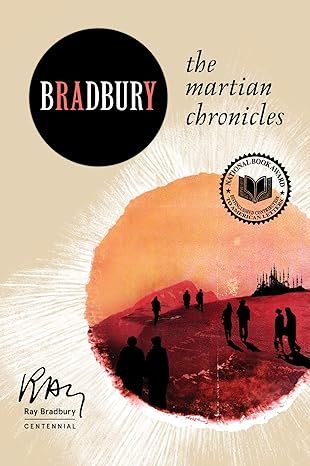
The Martian Chronicles
4.5
-
7,293
$0.99
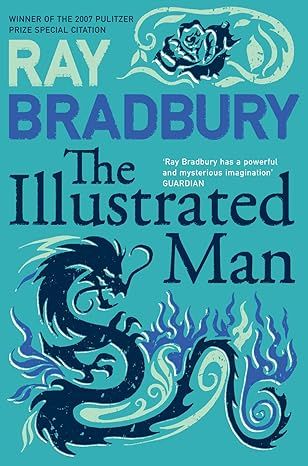
The Illustrated Man (Flamingo Modern Classics)
4.6
-
4,344
$9.31
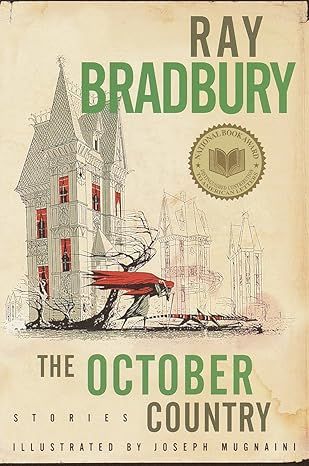
The October Country: Stories
4.6
-
1,736
$12.99
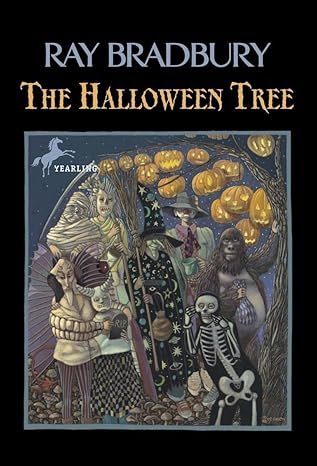
The Halloween Tree
4.6
-
3,112
$1.99
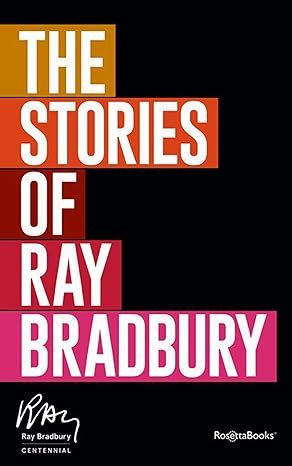
The Stories of Ray Bradbury: Introduction by Christopher Buckley (Everyman's Library Contemporary Classics Series)
4.7
-
1,003
$2.99
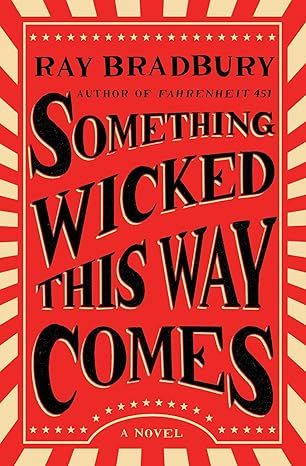
Something Wicked This Way Comes: A Novel
4.4
-
6,928
$0.99
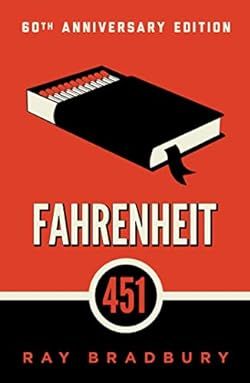
Fahrenheit 451
4.6
-
52,920
$4.68
Best Sellers

The Tuscan Child
4.2
-
100,022
$8.39

The Thursday Murder Club: A Novel (A Thursday Murder Club Mystery)
4.3
-
155,575
$6.33

Sapiens: A Brief History of Humankind
4.6
-
140,302
$13.49

The Butterfly Garden (The Collector, 1)
4.3
-
88,556
$9.59

Things We Hide from the Light (Knockemout Series, 2)
4.4
-
94,890
$11.66

The Last Thing He Told Me: A Novel
4.3
-
154,085
$2.99

The Perfect Marriage: A Completely Gripping Psychological Suspense
4.3
-
143,196
$9.47

The Coworker
4.1
-
80,003
$13.48

First Lie Wins: A Novel (Random House Large Print)
4.3
-
54,062
$14.99

Mile High (Windy City Series Book 1)
4.4
-
59,745
$16.19

Layla
4.2
-
107,613
$8.99

The Locked Door
4.4
-
94,673
$8.53
